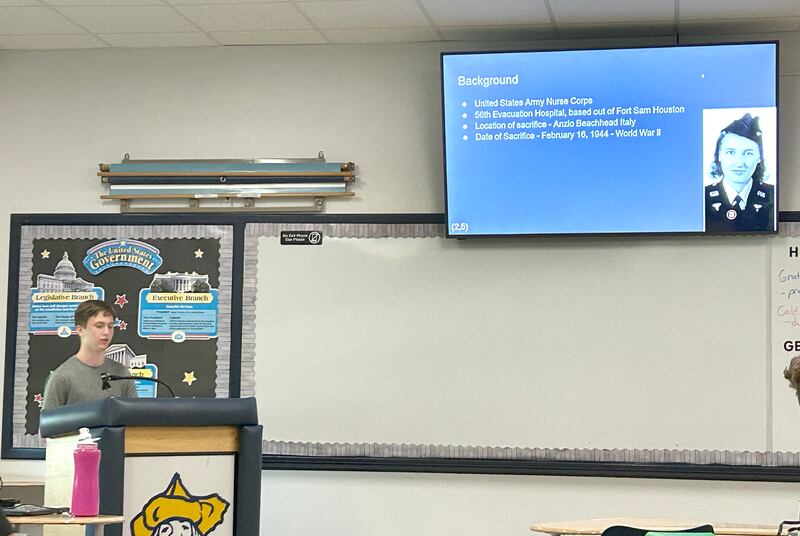POLO – Kenneth M. Ballard, 26, of Mountain View Valley, California, lost his life while serving with the Army in Iraq in 2004.
Rosalyn L. Schulte, 25, of St. Louis was the first U.S. Air Force Academy female graduate to be killed in action, in 2009, when an explosive device hit the convoy she was riding in near Kabul, Afghanistan.
And Army nurse Ellen Ainsworth, 24, of Menomonie, Wisconsin, died Feb. 16, 1944, after being wounded four days earlier when a German artillery round exploded outside the canvas-tent hospital where she refused to leave patients under her care during the battle at Anzio, Italy, during World War II.
Those were just three of the veteran stories Polo High School juniors researched and then shared with their classmates as part of “the Grateful Nation Project” – a nationwide effort honoring those who gave their lives while serving.
:quality(70)/cloudfront-us-east-1.images.arcpublishing.com/shawmedia/63DBZV7EQ5EXPIMDI4VETNOEI4.jpg)
Social studies teacher Jeff Bargar requested that the program be added to Polo’s social sciences curriculum when he learned that Durand High School was taking part in the program.
“Durand started it last year, so I reached out to them,” Bargar said. “At that time, Durand was the only school in Illinois offering the program. I talked to our principal, Andy Faivre, about adding it here, and he said yes. I think we are only the second school in Illinois to do it.”
:quality(70)/cloudfront-us-east-1.images.arcpublishing.com/shawmedia/CHYNYTZWHBEYLD6SX6Y7ZW4DFA.jpg)
The program, offered through the Grateful Nation Project – a charitable organization – provides students with “Hero Cards” that give basic information about U.S. veterans who made the ultimate sacrifice while serving.
:quality(70)/cloudfront-us-east-1.images.arcpublishing.com/shawmedia/HBFHAZ4IH5B6TD63Q2HMSTWLLU.jpg)
After students randomly select a Hero Card, they are tasked with researching the circumstances surrounding the person’s death and any other available information involving the conflict in which that veteran served.
:quality(70)/cloudfront-us-east-1.images.arcpublishing.com/shawmedia/OG3ZLFVCP5BNPHMYRDMWJIKB7E.jpg)
The students then present their research in class.
Some of those presentations were held May 15 in Bargar’s classroom.
Joe Rowland told his class about Ainsworth – how she grew up in Wisconsin, went to Eitel Hospital School of Nursing in Minneapolis, graduating in 1941, and then signed up for the U.S. Army Nurse Corps in 1942.
:quality(70)/cloudfront-us-east-1.images.arcpublishing.com/shawmedia/JENTO4LFZVFCREG2Y5G5QRCG5Q.jpg)
Through a slideshow presentation, he said her medical unit was sent first to Morocco, then Tunisia, then to Salerno, Italy, in September 1943.
In late January 1944, she was sent to the beachhead at Anzio, Italy, when her canvas-tent hospital was bombarded by German artillery.
“On Feb. 10, 1944, the 56th Evacuation Hospital came under attack by heavy enemy bombardment. As some nurses rushed patients into nearby bunkers, some medical personnel remained in the tents to take care of those too injured to be moved. Lt. Ellen Ainsworth chose to stay,” Rowland told the class.
According to her Hero Card, eyewitness accounts say Ainsworth calmly directed the placing of 42 patients on the ground to avoid further injury, saving their lives, but she was mortally wounded when a German artillery round exploded just outside of her ward tent. After four days, she succumbed to her injuries Feb. 16, 1944, at the age of 24.
On March 9, 1944 – what would have been Ainsworth’s 25th birthday – her family back in Glenwood City received a telegram informing them of her death.
She was posthumously awarded the Silver Star medal, the third-highest military decoration for valor in combat.
“I enjoyed learning a lot about her,” Rowland said after his presentation.
The project was just one of the learning tools Bargar used in the week leading up to Memorial Day.
“We had people from the American Legion view some of the presentations and then talk with them about their experiences,” Bargar said. “Next year, we want to continue that with the VFW and the American Legion.
“A future objective of the project will seek to partner with the Polo American Legion Post in researching local fallen service men and women, and have these individuals added to the selection of Hero Cards.”
Bargar’s students seemed to embrace the project, listening intently as each student made their individualized multimedia presentation.
:quality(70)/cloudfront-us-east-1.images.arcpublishing.com/shawmedia/HV3BU4ZDOBHWDM6ALF5BVJPVA4.jpg)
“I think it helps bring perspective. Then they can talk to their parents and relatives about their experiences,” Bargar said.
About the Grateful Nation Project
According to its website, the Grateful Nation Project HC Inc. is a registered 501(c)(3) nonprofit, all-volunteer organization for charitable, educational and literary purposes.
“We use charitable donations to fund the research, development, promotion and distribution of fallen U.S. service members’ stories to schools and homes across the nation,” according to the website.
Its mission: “We gather, preserve and share the true stories of those who gave ‘the last full measure of devotion’ for our freedom. We create Hero Cards and online biographies for U.S. military service members – from the Revolutionary War to the present day – who lost their lives while serving our country. Through the Grateful Nation Project, we are sharing these heroes’ stories with students across the nation."
How it works
The project delivers a Hero Card for every student with the fallen service member’s image, basic information and a brief part of their story. The numbered card leads to a permanent online tribute with a more detailed narrative description for each hero. The project includes heroes from the Revolutionary War to the present day.
“The lessons of history can sometimes be reduced to dates and events. But the sacrifices made to purchase our freedoms are made by real people with real families … who have real stories," according to the website. “Freedom is not free. We can never repay those who have made the ultimate sacrifice in preserving for us the rights, privileges and freedoms we enjoy today. But we can preserve their stories for future generations – and truly be ‘a grateful nation.’"

:quality(70)/author-service-images-prod-us-east-1.publishing.aws.arc.pub/shawmedia/c70d24f0-1332-4244-8446-e91288029474.jpg)